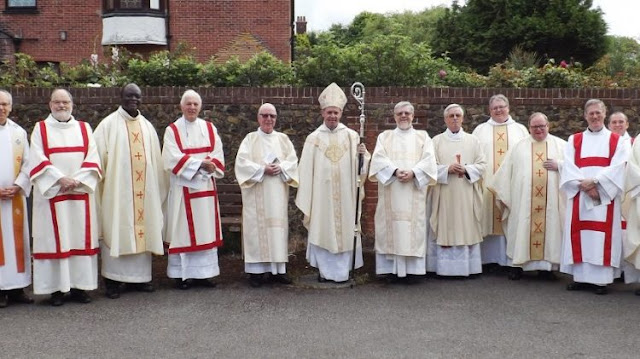Military Chaplains:
Ministering on the ‘front lines’ of the faith
 |
| Bishop Paul Mason, Bishop of the Forces in Great Britain. |
The 100th anniversary of the end of World War I is being
remembered the world over on Sunday. A Military Bishop reflects on the role of
military chaplains during peace time.
By Sr Bernadette Mary Reis, fsp
“We can have these ideas that the [military chaplain] spends
most of his life knee deep in blood on the front line. It’s not like that at
all”, Bishop Paul Mason, Bishop of the Forces in Great Britain explained in an
interview with Vatican News. Armistice Day and the remembrance of the 100th anniversary
of the end of World War One provides an occasion to understand the role of the
military chaplain during peace time.
Ministering to families
Bishop Mason described the work of a military chaplain as
quite similar to that of a parish priest. Military chaplains spend a lot of
time ministering to the needs and challenges faced by service personnel and
their families, he said. They provide support to officers, to families, and to
young recruits. “They are very busy”.
Ministering to young recruits
In addition, they provide a crucial role in the lives of new
recruits who find themselves perhaps for the first time away from home.
“They’re coming to the rather odd and challenging world
of the military. They are asking questions. They want to know about things of
faith. The number of confirmations or baptisms that our chaplains are doing
working with young recruits who are finding themselves at a point in their
life, a point of change when they’re asking questions which perhaps they’ve
never asked before. Perhaps they’ve never in their life encountered the Church
or a priest.”
Ministering as a Military Bishop
Bishop Mason was appointed by Pope Francis to the Bishopric
of the Forces in Great Britain in July this year. He said he is still getting
used to the role. The priority he has set for himself is that of supporting the
chaplains. His message to them is,
“This is the work of the Church. It has prayer at its
core. It has the Eucharist at its core. That is my practical role, as well as
my symbolic place: to ensure that it stays as that evangelical side of what
we’re doing – to bring the Gospel to people wherever we work.”
Visiting the garrison churches
He has made a commitment to visit the garrison churches.
Although they seem to be like any other normal parish, he has to remind himself
that each of those present is connected to the military. “They need support and
I try to visit and get down to as many of those churches as I can”, he said.
Place of the Church in the military establishment
Bishop Mason has also begun to understand the importance of
the presence of the Church in the hierarchical structure of the military
establishment itself.
“To have the physical presence of the Catholic Church,
having the conversation at that level, representing the interests of the
Catholic Faith at that level, is really important.”
He, therefore, sees his own role as one of ensuring that the
Catholic Church is present and fully engaged in order to promote the spread of
the Gospel in the military environment.
Keeping the faith alive
Chaplains serving outside of normal parish settings can
experience a struggle to keep the faith alive, Bishop Mason continued.
“There are so many other pressures to reduce the
spiritual input to effectively a type of social work…. To ensure that the
faith-based understanding of the Church within the military remains front and
centre”.
Openness to the Faith
On the whole, Bishop Mason has found an openness to matters
of faith in the military.
“It’s wonderful. You’re not pushing at a closed door.
You’re pushing very much at an open door. Because the experience on the ground
is that the place of religious faith in military context at so many levels is
that it provides support, it gives morale, it helps people in their journeys of
faith, coming to terms with what they are doing.”
Không có nhận xét nào:
Đăng nhận xét